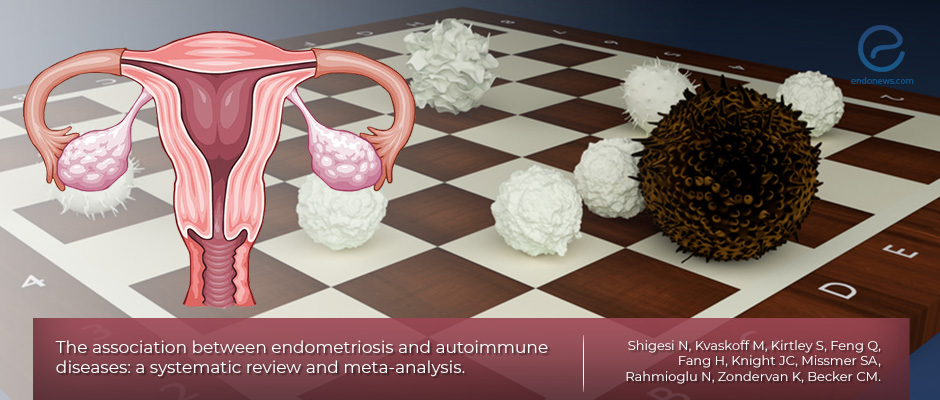Association between endometriosis and autoimmune disorders is not clear yet
Jul 19, 2019
Further studies needed to reach a link between autoimmune diseases and endometriosis
Key Points
Highlight
- Immune system abnormalities have been suggested to explain endometriosis, and an association between endometriosis and autoimmune diseases has been proposed.
- Analysis of the published research data investigating this association from population-based studies will facilitate our understanding.
- Large and well designed prospective research with genetic and biological analyses are necessary to understand whether endometriosis and autoimmune diseases have a kind of "chicken and egg relation" or, if not and they arise independently, whether these two disorders share similar pathophysiological mechanisms.
Background:
- Major databases searched (MEDLINE, Embase, Web of Science, and CINAHL) using terms including the combination of ‘endometriosis’ and ‘autoimmune diseases’.
- Quality assessment of the included studies was performed.
Key points:
- Twenty-six published research articles looking for an association between endometriosis and autoimmune diseases met eligible criteria.
- These quantified a link between endometriosis and several autoimmune diseases, including systemic lupus erythematosus (SLE), Sjogren’s syndrome (SS), rheumatoid arthritis (RA), autoimmune thyroid disorder, coeliac disease (CLD), multiple sclerosis (MS), inflammatory bowel disease (IBD), and Addison’s disease.
- In the final analysis; it was wound that the quality of the evidence was poor due to the high risk of bias in the majority of the chosen studies.
- Just five studies could provide high-quality evidence, and among these, 4 supported a statistically significant association between endometriosis and at least 1 of the examined autoimmune disease (namely SLE, SS, RA, CLD, MS, or IBD).
Lay Summary
Endometriosis is a common disorder that may affect up to 10% of women of reproductive age. The causes of endometriosis are largely unknown but abnormalities in immunity have been suggested to explain the origin of ectopic endometrial tissues. Evaluation of currently published results linking the association between endometriosis and autoimmune diseases may help our understanding of the disease process better. Shigesi and associates from the UK have compiled the results from major medical databases and published their analysis in Human Reproduction Update. The aim of this study was to systematically review the literature on population-based studies investigating a link between endometriosis and autoimmune diseases.
Major medical data databases were searched using the terms relating to ‘endometriosis’ and ‘autoimmune diseases’. Study inclusion criteria focused on peer-reviewed published articles that reported an association between endometriosis and autoimmune diseases, excluding case reports/series, review papers, meta-analyses, organizational guidelines, editorial letters, expert opinions, and conference abstracts. Quality assessment of included studies was also performed.
Twenty-six published population-based cross-sectional, case-control, and cohort studies looking for an association between endometriosis and autoimmune diseases were included in this review. The studies looked for an association between endometriosis and systemic lupus erythematosus (SLE), Sjogren’s syndrome (SS), rheumatoid arthritis (RA), autoimmune thyroid disorder, coeliac disease (CLD), multiple sclerosis (MS), inflammatory bowel disease (IBD), and Addison’s disease.
The quality of the evidence has been generally poor due to the high risk of bias in the majority of the chosen study designs and statistical analyses. Just merely five studies could provide high-quality evidence, and among these, 4 supported a statistically significant association between endometriosis and at least 1 of the autoimmune disease: SLE, SS, RA, CLD, MS, or IBD.
Better designed cohort studies with confounding control and mediation quantification, as well as genetic and biological studies, are needed to generate further insights into whether endometriosis is linked to autoimmune disorders. Such discoveries may offer opportunities for non-hormonal medications such as immuno-modulators or repurposing of existing immunomodulatory therapies for endometriosis.
Research Source: https://www.ncbi.nlm.nih.gov/pubmed/31260048
autoimmune diseases population study medical database

